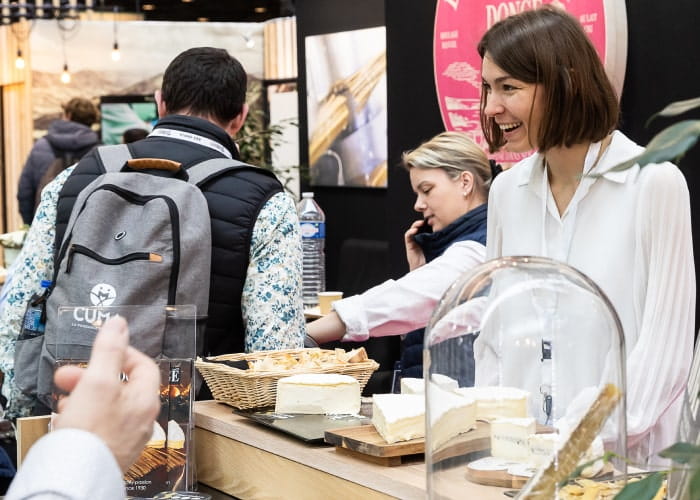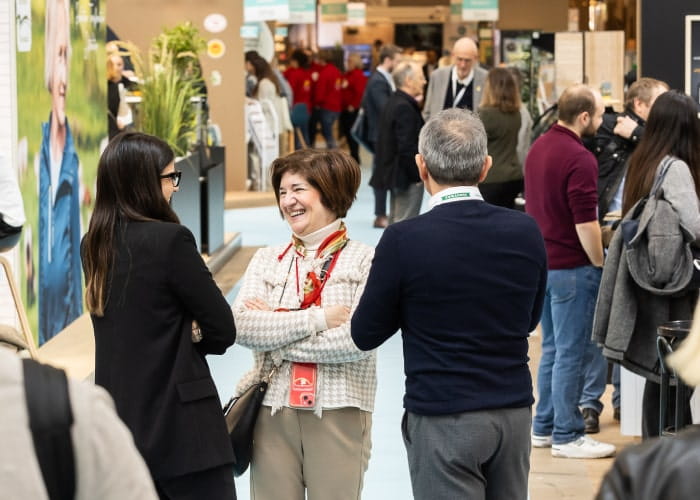
Consumers are tending to ask more and more questions when buying dairy products. They ask about production methods, health benefits and care for the environment.
They are more demanding and expect more guarantees from the Protected Designations of Origin (PDOs).
PDO cheeses, butters and creams make commitments in line with consumer expectations. The CNAOL, the Comité National des Appellations d'Origine Laitières (French National Committee for Dairy Designations of Origin), is considering how to make and implement global commitments to do with PDOs.
Why talk about future commitments for PDOs?
Talking about a commitment to the future means the PDOs can be rooted in a tradition. In the past, the Designations served to enhance the image of challenging areas, such as mid-altitude mountains for example, and to enable farmers to settle in these areas.
PDOs are the legacy of what our predecessors built. They are committed to passing on this legacy, ensuring continuity, and making their own contribution to the know-how of French territories.
Sustainable dairy PDOs are committed to meeting consumer expectations, first and foremost in terms of quality and taste. But the promise of PDOs goes beyond that: it helps to keep a territory alive, to stimulate purchases that help to develop employment opportunities and to enable producers to make a living from their profession.
They are therefore committed to helping to keep our territories open: to develop them, to preserve our natural resources, our biodiversity and our water supply. The challenge is to continue to create an economy that benefits from the complementarity between agriculture, PDOs and local tourism.
However, the reality is complex in these territories. Each Designation has a different history, culture, and animals. How can global commitments be made and how can they be adapted to each PDO?
What are consumers' expectations?

How can we identify consumers' purchasing criteria?
A recent survey conducted by the CNIEL and CREDOC identified consumers' purchasing criteria. Not surprisingly, the main criterion is taste! The products' organoleptic quality is what drives consumer spending.
To find out more, and in order to look closely at the responses that PDOs can provide to societal expectations, a survey was carried among the members of the Fédération des Fromagers de France (French cheesemongers' federation) just before the Show.
The cheesemongers that were questioned come from all over France and work in shops. They were asked to report the recurring questions their customers asked, and those customers' perception of the PDO label.
Cheesemonger customers are particularly interested in:
- Heat processing of milk: raw, pasteurised or thermised milk
- Where the product is from
- Production: dairy or farm cheese
- The benefits of raw milk
The cheesemongers also mention the emergence of certain less frequent questions on:
- Animal welfare
- The product's environmental impact
- The PDO and PGI (Protected Geographical Indication) specifications
- Producer remuneration
According to the cheesemongers polled, these questions will become more frequent in the coming years: consumers will be more attentive to these issues.
What guarantees do PDOs provide?
Sustainable dairy PDOs have an essential 'support role'. They provide the information that cheesemongers need to answer consumers' questions - and therefore guide them in their choice of dairy products.
According to the cheesemongers who responded, the PDOs provide them with all the information they need to answer the more frequent questions. On the other hand, they feel that they do not have the wherewithal to respond properly to the emerging questions.
According to the professionals that were polled, the PDO label provides the following guarantees:
- The origin of the product
- The preservation of traditional know-how
- Product typicity
- The sustainability of traditional livestock farming methods
- The vitality of the territory concerned
Aspects that are not guaranteed by PDO labels are said to be:
- Countryside stewardship
- Diversity of economic stakeholders
- Redistribution of value among the stakeholders
- Animal welfare
The responses from the cheesemongers helped to pinpoint consumer expectations. These are based on three pillars, which must be addressed if PDOs are to make a commitment to the future of consumers: economic, environmental and social.
The three pillars of sustainability
The economic aspect
Different surveys reveal that citizens' questions regarding the economic pillar are as follows:
- How do we ensure added value is shared among all the stakeholders in the chain (milk producers, cheese manufacturers, affineurs)?
- How can we maintain the diversity of stakeholders?
Among the PDOs, some concrete examples answer both questions:
- Supply regulation rules reduce market disruption and adjust supply to demand. They also help to preserve the organoleptic quality of a product.
- Certain PDO specifications set limits to the size of the workshops, the size of the vats and set collection boundaries. This makes it possible both to maintain a diversity of stakeholders and to better promote those who work in the same sector.
The environmental aspect
Consumer expectations about the environmental impact of dairy products are mainly related to animal welfare, biodiversity, and preserving local resources.
The sustainable dairy PDOs have a progress-oriented approach that is centred around two themes:
- Traditional farming and production methods
- Production methods that make the most of local resources, natural resources and, above all, resources that are suited to the territory.
In concrete terms, their commitments are as follows:
- 85% of PDOs have grazing obligations in their specifications. The animals are outdoors and graze naturally, which contributes to their well-being.
- In order to take care of biodiversity, PDOs meet the obligation to have hedges, pastoral circuits and permanent grassland. Maintaining local breeds in small numbers, in a given territory, also contributes to biodiversity.
- In order to preserve local resources, PDOs demand of their animal feed manufacturers that they use regional or local resources, and without GMOs.
The social aspect
On the social angle, consumers' expectations focus on four criteria:
- How to collective operate?
- Democratic process
- Guaranteed taste
- The preservation of traditional practical skills
In the PDOs, the commitments on these aspects are as follows:
- According to the statutes, PDOs necessarily have a defence and management body. This organisation represents all the operators in the sector (from milk producers to manufacturers and affineurs and including packaging for certain designations).
- It functions democratically, since all the operators are represented. There is a board and a general assembly.
- Products are regularly assessed by an organoleptic review committee to ensure that their taste is in line with expectations. This involves a tasting session carried out by operators in the sector, but also by external operators who are 'memory trustees' .
- The preservation of traditional know-how is guaranteed by the specifications. Approximately 80% of PDOs are made with raw milk and some of them also preserve traditional tools: the use of spruce boards, local materials, etc.
A joint commitment framework: the Sustainable Dairy PDO Plan
The PDOs provide a concrete response to consumers' expectations and questions. This progress-oriented approach can always be amplified, as consumer expectations develop.
In order to go further and make their commitments more legible, the sustainable dairy PDOs are developing a joint plan.
Six specific themes are identified for each of the three sustainability pillars (economic, environmental, and social).
Each has its own objectives, making 18 shared objectives for sustainable dairy PDOs in total. Each PDO must meet the 18 objectives. However, in order to preserve each one's specific features, they can choose from 65 commitments. The aim is not to reduce the diversity and richness of PDOs, but to preserve them while providing joint responses to these 18 objectives.
As of March 2022, 46 PDOs are committed and 28 collectives have started concrete work on their approach. The CNAOL provides support along the way.
13 PDOs have identified the commitments they intend to meet. On average, they each selected 32 commitments: well beyond the required 18! One of them even ticked 62 of the 65 "commitment boxes" available.
There is an established timetable for creating the joint plan. By June 2022, all PDOs had to have identified their responses to the 18 objectives. The projects to meet these objectives must be put in place between 2022 and 2025.
Then between 2025 and 2030, the specifications will be revisited so that all these sustainability aspects can be included. This is the guarantee for consumers and the ultimate commitment in PDOs.
Working towards recognition of the label
If sustainable dairy PDOs are to represent a real guarantee for consumers, they need to become better known.
The label is the focus of a communication campaign aimed at industry professionals and large retailers.
Sustainable dairy PDOs are working on the guarantees they provide to the consumer, while at the same time improving their notoriety to convey their values as they stand: both traditional and sustainable.
Communication and improving label recognition are down to all the professionals in the sector, so that we can make consumers aware of our production realities and convey our commitments to them.

Your profile EXHIBITOR


